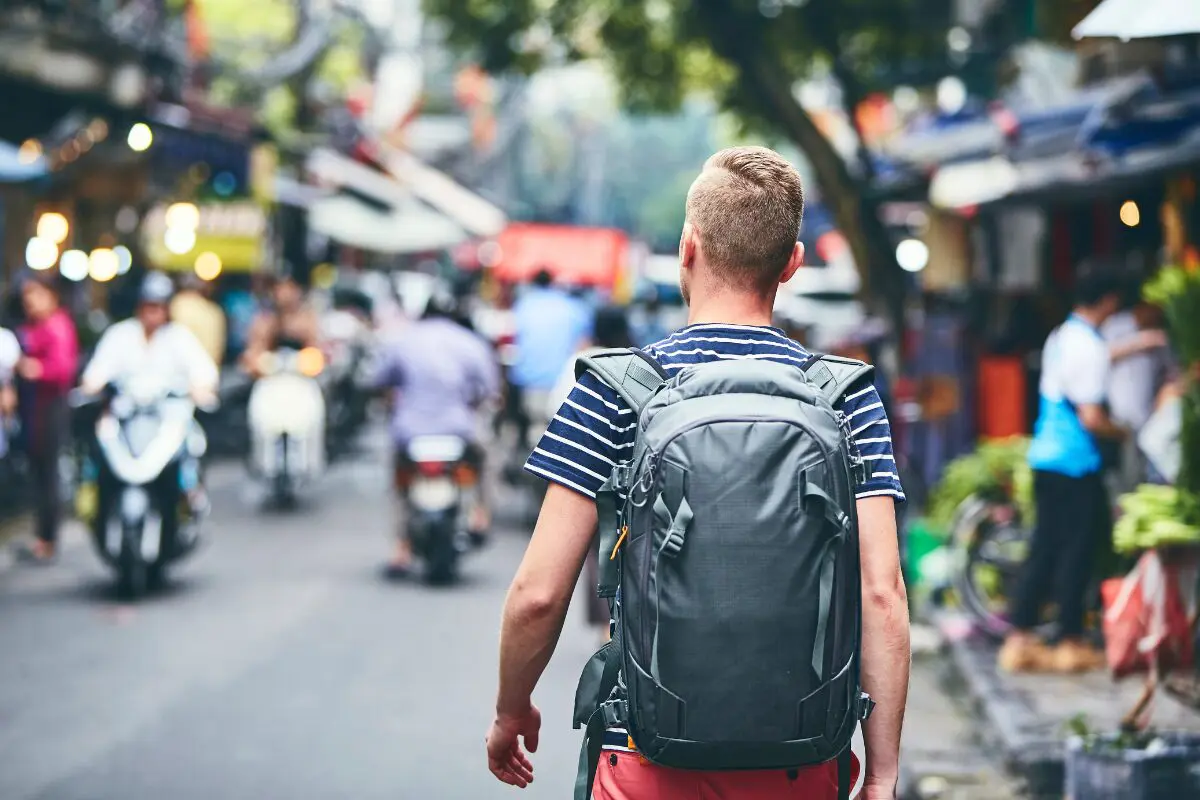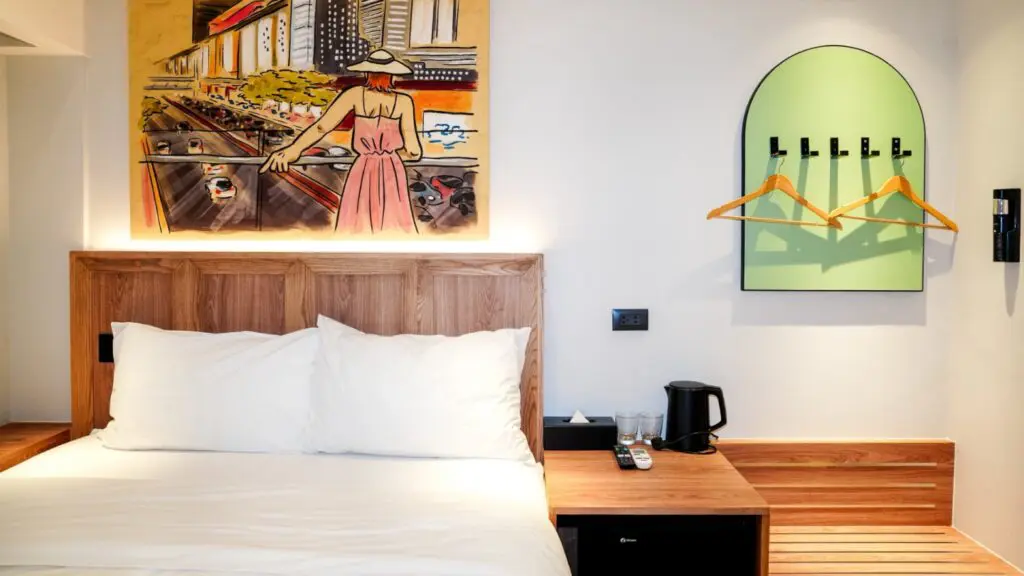
Staying in hostels has become a popular choice for budget travelers and solo adventurers alike. It’s not only a cost-effective accommodation option, but it also offers the chance to meet other like-minded travelers.
Whether you’re staying in a private room or a dorm room, hostel life can be fun and adventurous, but it also requires some savvy know-how to stay safe and comfortable.
Lub d will cover everything you need to know about how to survive staying in a hostel, how to keep your belongings safe in a hostel, and tips for solo travelers navigating this shared space experience.
1. Why Stay in a Hostel?

1.1 Benefits of Hostel Life
Hostels are designed to be budget-friendly, making them a top choice for solo travelers, backpackers, and groups. Staying in a dorm room or private room in a hostel provides an affordable way to explore new places, while also offering opportunities for socializing.
1.2 Budget Travel at Its Best
Hostels typically charge per bed, not per room, making them far cheaper than traditional hotels. Plus, many hostels offer additional perks such as free Wi-Fi, community kitchens, and even organized tours or pub crawls.
2. Choosing Between a Private Room and Dorm Room

2.1 The Pros and Cons of a Private Room
A private room gives you the luxury of space and privacy. If you value personal space and don’t mind spending a little more, this option may be perfect for you. However, private rooms in hostels tend to be less social than dorm rooms, which are great for meeting fellow travelers.
2.2 The Dorm Room Experience
Staying in a dorm room means you’ll share a sleeping space with multiple people. This can be a unique experience—often more social—but requires some extra preparation to make sure your belongings and personal space are secure.
3. How to Survive Hostel Life: Essential Tips

3.1 Bring Earplugs and an Eye Mask
Dorm life can be noisy, especially if your roommates are arriving late or leaving early. To ensure a good night’s sleep, pack earplugs and an eye mask. These essentials will help you block out disturbances and make your stay more comfortable.
3.2 Be Friendly but Mind Personal Space
Hostels are inherently social places, but respecting others’ space is crucial. Greet your roommates, but don’t invade their personal areas. Being friendly but mindful helps create a better environment for everyone.
4. How to Keep Belongings Safe in a Hostel

4.1 Always Use a Locker
Most hostels provide lockers to store your belongings. It’s important to bring your own padlock and secure any valuables inside. If a locker isn’t available, keep your bags and belongings as close to you as possible, or under your bed.
4.2 Don’t Leave Valuables Unattended
Avoid leaving your phone, wallet, or passport out in the open. Even in private rooms, it’s a good practice to lock away your important items when you leave the room.
5. Solo Travel in Hostels: How to Thrive

5.1 Socializing as a Solo Traveler
Hostels are ideal for solo travelers looking to meet new people. Most hostels offer communal spaces such as lounges, kitchens, and terraces where you can strike up conversations with fellow travelers. Don’t be shy—introduce yourself and join in on hostel activities.
5.2 Balancing Social Time and Alone Time
While it’s great to socialize, solo travelers should also carve out time for themselves. Whether it’s a quiet breakfast before the crowd wakes up or a peaceful evening stroll, balancing social time with alone time is key to enjoying your trip.
6. Hostel Safety Tips for Solo Travelers

6.1 Choose a Hostel with Security Features
When selecting a hostel, read reviews about its security measures. Look for places that offer 24-hour reception, lockers, keycard access, and security cameras. A well-secured hostel will give you peace of mind during your stay.
6.2 Keep a Close Eye on Your Belongings
In shared dorms, theft can happen. Be vigilant about your belongings, and avoid flashing expensive items. It’s always wise to keep a copy of your important documents stored safely, either digitally or in a secure part of your luggage.
7. Packing Essentials for Hostel Life

7.1 Padlock and Security Cable
As mentioned, securing your belongings is essential. A strong padlock for your locker and a security cable to lock your bags together or to your bed can offer extra peace of mind.
7.2 Power Bank and Universal Adapter
Hostels may have limited power outlets, especially in dorm rooms. Bring a power bank to ensure your devices stay charged and a universal adapter to avoid compatibility issues.
8. The Do’s and Don’ts of Hostel Etiquette
8.1 Do Be Respectful of Noise Levels
Quiet hours are common in hostels. Always be mindful of others, especially when arriving late or packing early.
8.2 Don’t Hog the Bathroom
In hostels, shared bathrooms are common, so be courteous and don’t spend too long getting ready. Quick showers and clean-up go a long way in keeping the space pleasant for everyone.
9. How to Survive a Long Hostel Stay

9.1 Rotate Your Outfits
Staying at a hostel for an extended period can mean fewer laundry facilities. Rotate your outfits strategically, and pack lightweight, quick-drying clothes that can easily be washed in a hostel sink if needed.
9.2 Plan Rest Days
If you’re moving from one city to another, hostel life can get exhausting. Plan some rest days where you can recharge, whether it’s spending an afternoon at a park or taking it easy at the hostel.
10. Protecting Yourself with Travel Insurance
10.1 Why Travel Insurance Matters
Investing in travel insurance is a smart move for hostel travelers. It protects against lost belongings, medical emergencies, and unexpected cancellations. Make sure your policy covers theft and loss, particularly in shared accommodation settings.
10.2 How to File a Claim
If something does go wrong and you need to file a claim, keep all documentation and receipts. Most insurers require proof, so take photos or keep records of any damages or theft.
11. Making Friends and Memories

11.1 Join Hostel Activities
Many hostels offer social events like barbecues, tours, and game nights. Participating in these activities is a fantastic way to meet other travelers and create lasting memories.
11.2 Keep in Touch
Hostel life often leads to meeting people from all over the world. Exchange contact info and stay in touch—many travelers form lifelong friendships with the people they meet while on the road.
FAQs: Staying in a Hostel
Q1. Are hostels safe for solo travelers?
Yes, hostels can be very safe, especially those with keycard access, lockers, and 24-hour reception. Always check reviews for security details.
Q2. What should I bring when staying in a hostel?
Bring a padlock, earplugs, an eye mask, and a universal adapter. If possible, pack a power bank to charge your devices on the go.
Q3. How do I keep my belongings safe in a hostel?
Use a locker for your valuables and always keep important items like your passport and phone close to you. A padlock is essential for securing your locker or bag.
Q4. Should I stay in a private room or dorm room?
It depends on your preference. A private room offers more privacy, while a dorm room is cheaper and provides more opportunities to socialize with fellow travelers.
Q5. How do I meet people while staying in a hostel?
Join communal activities, hang out in shared spaces, and don’t be afraid to introduce yourself to other travelers. Hostels are designed to be social environments.
Q6. Can I cook in a hostel?
Most hostels have communal kitchens, allowing you to prepare your meals. Check the hostel’s amenities to ensure this option is available.
Conclusion
Staying in a hostel can be a thrilling and cost-effective experience, whether you’re a seasoned solo traveler or embarking on your first adventure. By following these tips on how to survive staying in a hostel and how to stay safe, you’ll be well-prepared for a fun, social, and safe trip. Remember to pack wisely, secure your belongings, and embrace the unique culture of hostel life!
Join Our Lub d Tribe

Lub d offers affordable accommodations that provide unique experiences across various locations. Whether you’re staying at Lub d Bangkok Siam, Lub d Koh Samui, or Lub d Phuket Patong in Thailand, or exploring international destinations like Lub d Siem Reap,
Lub d Makati, and Lub d Osaka Honmachi, you’ll find comfort, community, and convenience. Each Lub d location is designed to cater to the needs of budget-savvy travelers, ensuring a memorable stay with top-notch amenities and a vibrant social atmosphere.
Remember, at Lub d, we’re committed to providing all travelers with a unique and memorable experience. Join us and be a part of the Lub d tribe!



